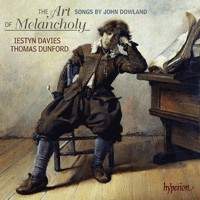Texte paru dans: / Appeared in:

Fanfare Magazine: 37:6 (07-08/2014)
Pour
s'abonner / Subscription information
Les abonnés à Fanfare Magazine ont accès aux archives du
magazine sur internet.
Subscribers to Fanfare Magazine have access to the archives of the magazine
on the net.
Hyperion
CDA68007

Code-barres / Barcode
: 0034571280073 (ID432)
Consultez toutes les évaluations recensées pour ce cd
~~~~ Reach all the evaluations located for this CD
Semper Dowland, semper dolens runs the title of one of his pieces, a mocking self-motto: Ever Dowland, ever doleful. There is good reason to suspect Dowland was a better-rounded personality than his best-known music suggests, but that wouldn’t be difficult to achieve. A musician who thought constantly along the lines of Go, crystal tears, and Flow, my tears, fall from your springs, and Burst forth, my tears, and Sorrow, stay, lend true repentant tears, and Lahcrimae, or Seven Teares, would probably have committed suicide early in life, or at the very least died of dehydration from constantly open tear ducts. But it was his exploration of the melancholic humor that gained Dowland his reputation, and that’s what most programs of his works concentrate upon.
On this release, the emphasis is on 16 songs with lute accompaniment, and five more transcribed for solo lute. (With 20 cuts, the last shares a song and lute solo.) And despite the disc’s title, The Art of Melancholy, the collection does mix in some of Dowland’s lighter material. Come again, sweet love doth now invite is one of these, and also one of greatest hits that he arranged in several formats. So is Can she excuse my wrongs, while Say, Love, if ever thou didst find was yet more popular in its day, and remains so. So natural is the setting of the words that it’s all too easy to underestimate Dowland’s craft in creating an apparently natural, flowing line that heightens rhetorical devices (“I sit, I sigh, I weep, I faint, I die”; “She, she, she and only she”).
That noted, Dowland did have an unfailing command of the more doleful portion of music’s expressive range. His Lachrimae pavan is probably the best-known of these, and enjoyed an international reputation during the composer’s lifetime. Here it can be heard in two versions: as the lute piece of its original incarnation, then as the song Flow, my tears, fall from your springs, whose popularity was such it was still being published in the 1680s. As an introduction to Dowland’s “sweet grieving” it could not be bettered, though so much else here is as good.
I’ve admired the voice and art of countertenor Iestyn Davies for a number of years, and praised him in reviews of Handel’s Flavio, Monteverdi’s L’incoronazione di Poppea, and Vivaldi’s Griselda. Though his command of coloratura is never tested by this music, his ability to enunciate the text and color the tone of his voice are. He manages these with ease, and is especially effective in delicately picking out notes in the lighter songs. To his credit as well, Davies doesn’t attempt to provide a period accent for any part of England. We have no knowledge of these, and the various “authentic” varieties I’ve heard live and occasionally reviewed on record each differ so much from the others as to render the idea untenable.
Coloring tone is also something Thomas Dunford does extremely well. His pliant phrasing, and sure touch with dynamics, are very welcome in his solos, while his accompaniment is discreet and appropriate. I have not heard his solo album devoted to Dowland (Alpha 187), though if it displays the same sensibility and technique as can be heard here, it would be well worth the purchase.
In excellent, close sound, this definitely is recommended.
Cliquez l'un ou l'autre
bouton pour découvrir bien d'autres critiques de CD
Click either button for many other reviews


